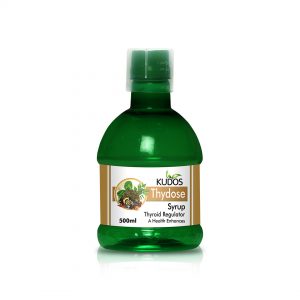Healing Your Thyroid with Ayurvedic Syrups: Tips and Strategies
Thyroid disorder is a medical condition affecting the gland, a small butterfly-shaped gland located in the neck. The gland produces hormones that control metabolism, growth, and development in the body. When the gland produces too much or too little hormone, it can lead to various disorders such as hypothyroidism, hyperthyroidism, goitre, and nodules.
Thyroid Syrup are herbal formulations commonly used in ayurvedic medicine to treat various health conditions. These syrups are made from herbs, spices, and natural sweeteners. Thyroid Syrup are believed to be safe and effective in treating multiple health problems due to their natural ingredients and holistic approach to healing.
Thyroid Syrup can benefit in healing as they contain various herbs and natural ingredients to help regulate the gland’s function. Ayurvedic herbs such as ashwagandha, guggul, and shilajit have been shown to improve function and reduce symptoms of disorders. These herbs regulate the production of thyroid hormones and reduce inflammation in the gland.
Thyroid Disorder

Located in the neck just below the Adam’s apple, the gland is a small gland shaped like a butterfly. It produces and releases hormones that regulate the body’s metabolism, heart rate, body temperature, and other vital functions.
Different Types Of Disorders:
Thyroid disorders come in different styles, which may include:
- Hypothyroidism: This occurs when the gland does not produce enough hormone, resulting in symptoms such as fatigue, weight gain, and depression.
- Hyperthyroidism: This occurs when the gland produces too much hormone, resulting in symptoms such as weight loss, increased heart rate, and anxiety.
- Thyroid nodules: These are growths on the gland that may be benign or cancerous. They can cause swelling in the neck and difficulty swallowing.
- Thyroiditis: It is a thyroid gland inflammation that a viral infection, autoimmune disease, or other factors can cause.
Causes And Symptoms :
The causes and symptoms of disorder vary depending on the specific type of disorder.
Hypothyroidism:
Causes:
- Autoimmune diseases such as Hashimoto’s thyroiditis
- Radiation therapy to the neck or head
- Surgery to remove the gland
Symptoms:
- Fatigue
- Weight gain
- Cold intolerance
- Constipation
- Depression
- Dry skin and hair
- Slow heart rate
Hyperthyroidism:
Causes:
- Autoimmune diseases such as Graves’ disease
- Thyroid nodules
- Overuse of hormone medication
Symptoms:
- Weight loss
- Rapid heartbeat
- Anxiety
- Tremors
- Sweating
- Heat intolerance
Thyroid nodules:
Causes:
- Unknown
- Genetic predisposition
- Exposure to radiation
Symptoms:
- Swelling in the neck
- Difficulty swallowing
- Hoarseness
Thyroiditis:
Causes:
- Viral infections
- Autoimmune diseases
- Pregnancy
Symptoms:
- Pain in the neck
- Swelling in the neck
- Fatigue
- Fever
- Weight loss or gain
- Changes in heart rate
Ayurvedic Syrup
Ayurveda is an ancient Indian system of medicine that focuses on the balance of the mind, body, and spirit to promote health and prevent illness. It is based on using natural remedies and techniques, including herbal medicine, diet, and lifestyle modifications, to maintain good health.
Ayurvedic Herbs For Healing:
Ayurveda uses a range of herbs and natural remedies to support health. Some of the most commonly used herbs for healing include:
- Ashwagandha: This herb is known for its adaptogenic properties and can help reduce stress and inflammation in the body, which can benefit those with thyroid disorders.
- Guggul: This resin is derived from the Mukul tree and has been used in ayurvedic medicine for centuries to support health by regulating hormone levels.
- Brahmi: This herb is traditionally used to support cognitive function and reduce stress, which can be helpful for those with thyroid disorders.
- Turmeric: This spice has potent anti-inflammatory and antioxidant properties, which can help reduce inflammation in the gland.
Tips for Healing Your Thyroid with Ayurvedic Syrups
Lifestyle changes to complement Ayurvedic treatment:
Along with Thyroid Syrup, lifestyle changes can also be crucial in supporting health. Recommended changes to one’s lifestyle may include:
- Getting enough rest and sleep: Lack of sleep and rest can increase stress levels and affect function. Aim to get 7-8 hours of sleep each night and incorporate relaxing activities, such as meditation or reading, into your daily routine.
- Managing stress: High-stress levels can affect function, so it’s essential to incorporate stress management techniques into your routine, such as yoga, meditation, or deep breathing exercises.
- Exercising regularly: Regular exercise can help improve metabolism and promote overall health. To maintain good health, engaging in moderate activity for at least 30 minutes on most days of the week, such as cycling or brisk walking, is recommended.
- Avoiding toxins: Exposure to toxins, such as pesticides or chemicals, can disrupt function. Avoid exposure to toxins by choosing organic foods, using natural cleaning products, and avoiding plastic containers.
Diet Modifications To Support Health:
Dietary changes can also play a significant role in supporting health. Recommended dietary changes may include:
- Eating nutrient-dense foods: Include a variety of nutrient-dense foods in your diet, such as fruits, vegetables, whole grains, and lean proteins.
- Avoiding processed foods: Processed foods often contain high amounts of sodium, sugar, and unhealthy fats, which can disrupt function. Try to avoid processed foods and instead focus on whole, unprocessed foods.
- Including iodine-rich foods: Iodine is essential for proper function, so include iodine-rich foods in your diet, such as seaweed, fish, and dairy products.
- Limiting goitrogenic foods: Goitrogenic foods can interfere with function, so it’s essential to limit your intake of these foods, such as broccoli, cauliflower, and kale.
Yoga And Meditation For Stress Relief And Healing:
Yoga and meditation are beneficial for managing stress levels and promoting health. Some yoga poses that can help support function include:
- Shoulder stand (Sarvangasana): This pose can help stimulate the gland and improve circulation to the head and neck.
- Fish pose (Matsyasana): This pose can help stretch and stimulate the gland.
- Plough pose (Halasana): This pose can help improve circulation to the gland and reduce stress.
Meditation can also help reduce stress levels and support function. Find a quiet place to sit comfortably, close your eyes, and focus on your breath. Aim to incorporate daily meditation into your routine, even if it’s just for 10-15 minutes.
Recommended Ayurvedic Syrups
Ayurvedic Syrup are natural remedies made with a blend of herbs and ingredients used in ayurvedic medicine for centuries. These Syrup are gaining popularity for their ability to support health and balance hormones. Here are recommended Ayurvedic thyroid syrups which help you.




